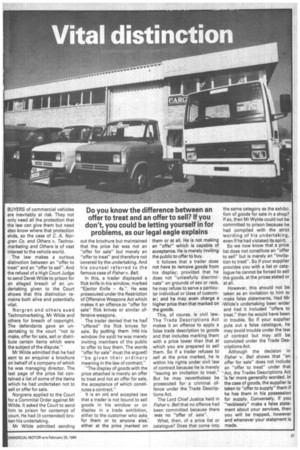BUYERS of commercial vehicles are inevitably at risk. They not
Page 39

If you've noticed an error in this article please click here to report it so we can fix it.
only need all the protection that the law can give them but need also know where that protection ends, so the case of C. A. Norgren Co. and Others v. Technomarketing and Others is of vast interest to the vehicle world.
The law makes a curious distinction between an "offer to treat" and an "offer to sell". And the refusal of a High Court Judge to send Derek Wilde to prison for an alleged breach of an undertaking given to the Court shows that this distinction remains both alive and potentially vital.
Norgren and others sued Technomarketing, Mr Wilde and others for breach of copyright. The defendants gave an undertaking to the court "not to make, offer for sale, sell or distribute certain items which were the subject of the dispute."
Mr Wilde admitted that he had sent to an enquirer a brochure on behalf of a company of which he was managing director. The last page of the price list contained a list of some of the items which he had undertaken not to sell or offer for sale.
Norgrens applied to the Court for a Commital Order against Mr Wilde. It asked the Court to send him to prison for contempt of court, He had (it contended) broken his undertaking.
Mr Wilde admitted sending out the brochure but maintained that the price list was not an "offer for sale" but merely an "offer to treat" and therefore not covered by the undertaking. And his counsel referred to the famous case of Fishery. Bell.
In this, a trader displayed a flick knife in his window, marked "Ejector Knife — 4s.". He was prosecuted under the Restriction of Offensive Weapons Act which makes it an offence.to "offer for sale" flick knives or similar offensive weapons.
The trader denied that he had "offered" the flick knives for sale. By putting them into his window (he said) he was merely inviting members of the public to offer to buy them. The words "offer for sale" must (he argued) "be given their ordinary meaning in the law of contract."
"The display of goods with the price attached is merely an offer to treat and not an offer for sale, the acceptance of which constitutes a contract."
It is an old and accepted law that a trader is not bound to sell goods in his window or on display in a trade exhibition, either to the customer who asks for them or to anyone else: either at the price marked on them or at all. He is not making an "offer" which is capable of acceptance. He is merely inviting the public to offer to buy.
It follows that a trader does not have to remove goods from his display; provided that he does not "unlawfully discriminate" on grounds of sex or race, he may refuse to serve a particular individual or class of customer; and he may even charge a higher price than that marked on the goods.
This, of course, is civil law. The Trade Descriptions Act makes it an offence to apply a false trade description to goods and that includes marking them with a price lower than that at which you are prepared to sell them. So if a trader refuses to sell at the price marked, he is within his rights under civil law of contract because he is merely "issuing an invitation to treat." But he may nevertheless be prosecuted for a criminal offence under the Trade Descriptions Act.
The Lord Chief Justice held in Fisher y. Bell that no offence had been committed because there was no "offer of sale".
What, then, of a price list or catalogue? Does that come into the same category as the exhibition of goods for sale in a shop? If so, then Mr Wylde could not be committed to prison because he had complied with the strict wording of his undertaking, even if he had violated its spirit. , So we now know that a price list does not constitute an "offer to sell" but is merely an "invitation to treat". So if your supplier provides you with a list or catalogue he cannot be forced to sell the goods, at the prices stated or at all.
However, this should not be taken as an invitation to him to make false statements. Had Mr .Wilde's undertaking been wider and had it included "offers to treat," then he would have been in trouble. So if your supplier puts out a false catalogue, he may avoid trouble under the law of contract but may still be convicted under the Trade Descriptions Act.
Although the decision in Fisher v. Bell shows that "an offer for sale" does not include an "offer to treat" under that Act, the Trades Descriptions Act. is far more generally worded. In the case of goods, the supplier is taken to "offer to supply" them if he has them in his possession for supply. Conversely, if you "recklessly" make a false statement about your services, then you will be trapped, however and whenever your statement is made.
































































































